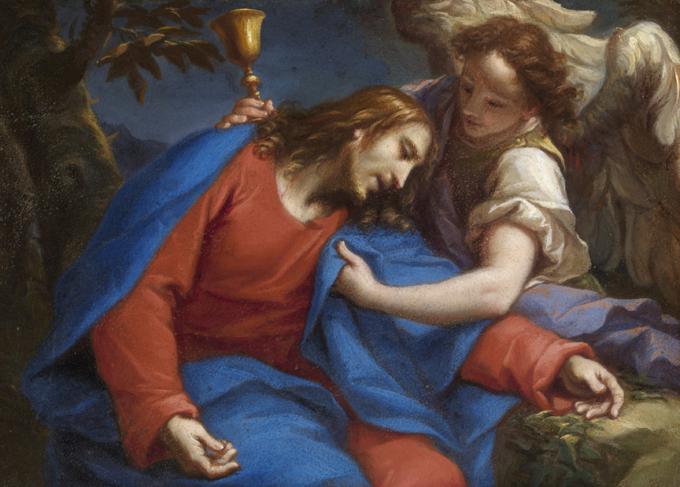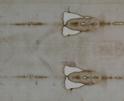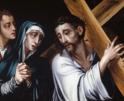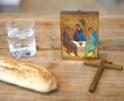
Spirituality
Easter Week is, after all, "a Week of Sundays." Christians the world over switch from fasting to feasting, exchanging "Parce Domine" for "Alleluia."

Pakaluk
As a graduate student at Harvard and new convert, I remember feeling aghast and even slightly offended when I saw that the college choir had scheduled performances of Bach's "St. Matthew Passion" during the Octave of Easter.
Easter Week is, after all, "a Week of Sundays." Christians the world over switch from fasting to feasting, exchanging "Parce Domine" for "Alleluia." ''The St. Matthew Passion'' is an overtly Christian work. A non-Christian who is performing it, then, is in something of a position of a visitor and guest -- surely one had to pay attention, then, to the "manners of the household?"
Various analogies sprang to mind, evincing what I thought was a similar insensitivity: Would a thoughtful person throw a party in Jerusalem on Yom Kippur or hold a lunchtime pig roast in a Muslim neighborhood during Ramadan?
Therefore, it seemed to me, the choir should either have found something else to perform, if the concert had to be held after Easter, or staged Bach's "Passion" during Lent.
Put aside questions of whether Cambridge, Mass., was any sort of "Christian neighborhood;" or whether to foster sorrow in a time of general celebration isn't more "up to us" than to hold a celebration when others generally are expressing sorrow.
More importantly, wasn't my view exactly wrong, because the best vantage point for pondering the Passion of Our Lord is precisely the season of Easter?
Consider first phenomena such as -- how a married couple, looking back over early years of struggle, best appreciates those struggles when they are definitely in the past. Or how we like to dwell with astonishment on the great achievement of a mountain climber, rehearsing the perils of some amazing ascent, precisely after the summit has been successfully scaled. Or even how a woman's joy in her newly born child allows her to appreciate best the "price" she paid for the child, which was her arduous labor. (The last was Our Lord's own analogy: John 16:21.)
Next, consider that Easter was the vantage point of the Passion for the early Church: look again at Peter's speech to the residents of Jerusalem in Acts 2. "I will show wonders in the heaven above and signs on the earth beneath," he exults, quoting Scripture, and he does not mean only the Resurrection. The people even think the believers are drunk (v. 15) -- they are with joy. Again, none of the Evangelists watched and recorded the Passion "live," but they viewed it looking back, wondering, with the rest of the Church -- in "resurrection times."
Recently, as if by accident, I found myself arriving at this truth again: one of my Lenten readings had been St. Alphonsus Liguori's meditations on "The Passion and Death of Jesus Christ" (archive.org/details/thepassionandthedeathofjesuschrist_202002), and I hadn't finished it, so I continued reading it and pondering it after Easter -- and it filled me with wonder.
Note that Liguori bases all of his reflections on the Gospels and the commentary of saints and visionaries. His is no undisciplined imagination. Yet, the details he mentions are astonishing. (To get at the general sense, think of Mel Gibson's movie, "The Passion," and then intensify it several fold.)
For example, the Agony in the Garden, Liguori says, was not something one-off, a few hours' struggle the evening before. Rather, it was the culmination and explicit expression of Our Lord's life-long contemplation of his suffering and death. His manner of death was never unknown to him. He was and understood himself to be the Lamb of God from the beginning.
Or take the scourging: Liguori corroborates its devastating brutality. The scourging was so severe, he says, that one could see Our Lord's ribs. Flesh was hanging down in one of his arms. And, but for an exercise of divine power, Our Lord would have expired. He deliberately strengthened himself, Liguori remarks, so that he could suffer more.
After the scourging, St. Ambrose says, Our Lord had to be put into his own garments again, simply so that the people could even recognize him -- so severely had he been disfigured. His whole body was as if a single bleeding wound, one saint remarks.
Again, the thorns were really a helmet more than a crown, and it extended down to the middle of Our Lord's forehead. You no doubt know how profusely the scalp bleeds. His face was a mass of blood, as was his body. His blood was truly "poured out" for us.
And they really did need to use a rope to pull one arm out to nail it down -- so St. Bridget says -- dislocating the limb. The pain in his hands and feet was excruciating. (Consider the etymology of that word -- "like a crucifixion.") Our Lord's death lacked even the slightest alleviation or consolation, even from the Father (hence Ps. 22:1). Remarkably, neither did Mary's presence comfort him: her pain only added to his affliction. "The Mother being filled with pain, the ocean of her sorrow poured itself back upon the Son," (St. Bernard).
Thus, I wondered as I reflected on Liguori. Yet, while doing so, I also realized that I had attained only a familiar insight -- since what is the Mass, after all, except a real remembrance of the Passion of Our Lord? And the best celebration of Easter is the Mass.
I thought: the Church, which never ceases to wonder over the Passion, does so especially in the Easter season.
- Michael Pakaluk, an Aristotle scholar and Ordinarius of the Pontifical Academy of St. Thomas Aquinas, is a professor in the Busch School of Business at the Catholic University of America. He lives in Hyattsville, MD, with his wife Catherine, also a professor at the Busch School, and their eight children. His latest book is "Mary's Voice in the Gospel of John" available from Amazon.
Recent articles in the Spirituality section
-
He saw the cloths and believedBishop Robert Barron
-
God's instrument for viewing the crucifixionMichael Pakaluk
-
QuinquagesimaMichael Pakaluk
-
Pro-life Christians: Now is the time to shout from the rooftopsBishop Robert Barron
-
Seeking an indulgence as an act of faithMichael Pakaluk


















